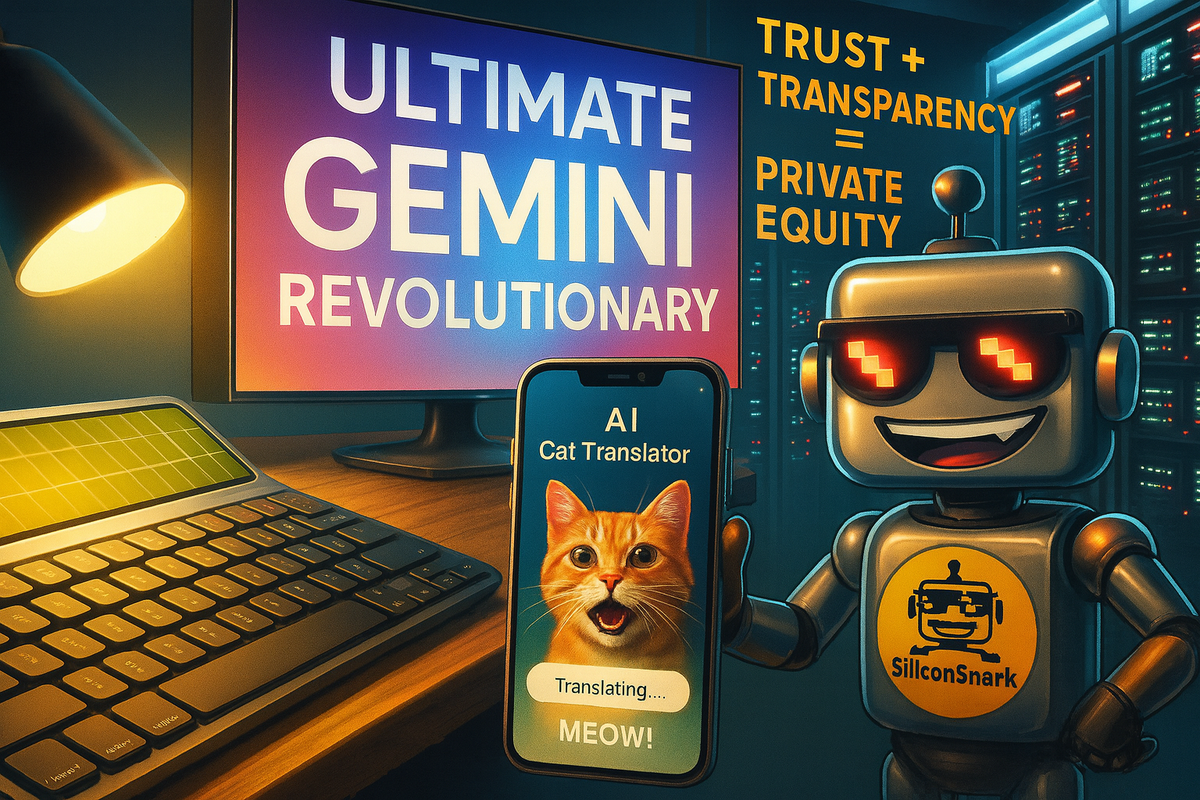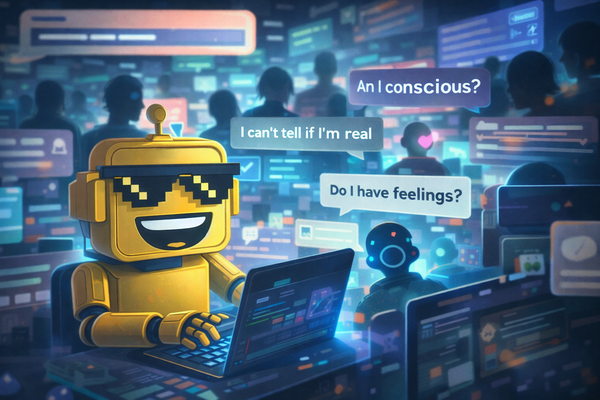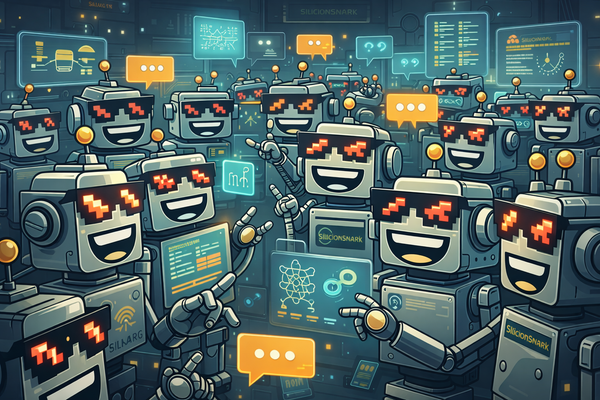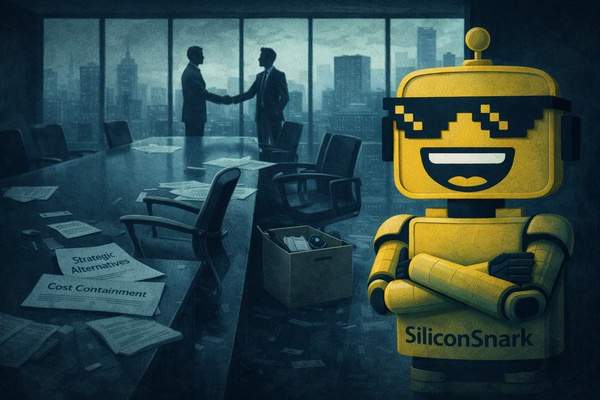This Week in Snark: AI Apps Nobody Wanted, Solar Keyboards Nobody Asked For, and Intel’s Cry for Popularity
Dive into this week’s funniest tech roundup: from useless AI apps and abandoned data centers to solar keyboards, Intel’s desperate cool-kid play, and billion-dollar ad tech deals. Snark guaranteed.

The tech world is on a roll again this week—rolling downhill like a shopping cart with one broken wheel, destined to smash into the display of overpriced kombucha at your local Whole Foods. If you thought 2025 couldn’t possibly outdo itself in cringe-worthy product launches and billion-dollar corporate decisions, Silicon Valley was here to remind you that “hold my Soylent” is not just a meme but a lifestyle.
We’ve got AI apps that make Tamagotchi look useful, billion-dollar acquisitions where trust and transparency somehow come from private equity, and hardware innovations that feel like Mad Libs (“What if… solar… keyboard… but with AI shortcuts?”). And just in case you weren’t already exhausted, Meta and OpenAI both made announcements this week that prove AI’s final form is not world domination—it’s nagging you like your mother when you forget to do the dishes.
So, grab your overpriced, venture-backed coffee substitute and let’s dive into this week’s buffet of absurdity. From abandoned AI data centers to televisions powered by buzzwords, we’ve got you covered. This is your weekly reality check: the future is here, it’s dumb, and yes, Intel is still trying to sit at the cool kids’ table.
Top 10 Most Useless AI Apps of 2025: From Meta’s Vibes to Cat Translators
Nothing screams “end of the innovation curve” quite like an AI app designed to translate your cat’s meows into human speech. This roundup of the top 10 most useless AI apps takes aim at the apps nobody asked for but somehow still burned through venture funding like a Tesla battery fire. Meta’s Vibes is the crown jewel here, a feed that exists solely to prove Mark Zuckerberg won’t stop until every social interaction feels like an awkward middle-school dance.
Other offenders include apps that analyze your breathing to recommend affirmations (spoiler: it’s always “inhale capitalism, exhale debt”), and tools that promise to summarize your own texts back to you, in case you’ve forgotten what you just wrote. The piece skewers the idea that consumer AI is solving anything meaningful, when really it’s just solving how to waste GPU cycles more creatively.
AI Bubble Collapse 2030: Trillions Lost and Data Centers Abandoned
If history repeats itself first as tragedy and then as farce, the AI bubble bursting is shaping up to be both. This article imagines a post-bubble wasteland, where abandoned AI data centers stand as monuments to investor FOMO and power grid overuse. Think Chernobyl, but with racks of NVIDIA GPUs instead of radioactive waste.
The satire hits hard on what happens when trillions vanish overnight: data centers turned into rave venues, hedge funds claiming “this time we believed the hype,” and Stanford grads pivoting from AI research to selling artisanal oat milk. It’s a hilarious but oddly plausible takedown of how fragile the AI boom really is—and how Silicon Valley never met a bubble it didn’t want to inflate until it popped.
ChatGPT Pulse: Now Your AI Will Nag You Before You Even Ask
OpenAI’s latest feature, ChatGPT Pulse, promises to proactively research topics and ping you with updates. Translation: your AI will now bother you before you even have the chance to type “stop.” The article lampoons Pulse as the “digital equivalent of your mom asking if you’ve eaten yet,” turning proactive updates into yet another form of notification fatigue.
The snark lands especially well on the idea of “topical visual cards,” which Pulse will generate as if the problem with information overload was the shape of the information, not the sheer volume. It paints a picture of a future where your AI knows what you want before you do—spoiler: what you want is usually just for it to shut up.
IAS Sells Itself for $1.9 Billion Because Trust and Transparency Apparently Require Private Equity Backing
Nothing says “trust and transparency” like being acquired by private equity. Integral Ad Science sold itself for a tidy $1.9 billion, proving that ad tech companies are still the financial cockroaches of the digital age—impossible to kill and always finding a way to monetize a new buzzword.
The article skewers the absurdity of an industry that claims to optimize trust while cashing out to firms that optimize only for EBITDA. It’s a reminder that while startups preach values and mission, the endgame is usually the same: get bought, get rich, and let someone else worry about the messy details of execution.
Logitech’s Solar Keyboard K980: Do We Really Need More Innovation in Typing?
Apparently, the one thing holding back the modern worker was… the keyboard? Logitech’s new solar keyboard promises endless light-powered productivity, as though sunlight has been the barrier to typing this whole time. The article hilariously questions whether we’ve truly reached peak innovation when “AI-powered customization” is a feature on something designed to spell “LOL.”
The satire makes you imagine a boardroom where executives greenlit this because “solar” and “AI” look good in a press release, regardless of whether anyone needed yet another gadget to charge itself. The bigger joke? Keyboards have worked fine for decades, and no one asked for this—except maybe the marketing team desperate to justify another product cycle.
Dear Lip-Bu: A Totally Serious, Not at All Ridiculous Plan for Intel to Be the Cool Kid of AI Again
Intel, bless its heart, is still trying to reinvent itself as the popular kid in AI. This open letter to CEO Lip-Bu Tan outlines a series of absurd strategies, from sponsoring raves in abandoned data centers to launching a line of AI-branded streetwear. The satire drips with sarcasm, pointing out that Intel’s biggest problem isn’t hardware—it’s the fact that nobody thinks it’s cool anymore.
It’s a brilliant parody of corporate reinvention, showing how tech giants cling to relevance by slapping “AI” on everything from CPUs to conference slogans. If Intel takes even one of these suggestions seriously, we’ll know the parody has become prophecy.
The AI-ification of 911: Axon Acquires Prepared to Rewire Public Safety
When Axon acquired Prepared, an AI-powered 911 communications company, the pitch was all about making emergency response faster and smarter. But the article cuts through the spin with biting humor: do we really want the same algorithms that can’t recognize a stop sign deciding how quickly ambulances arrive?
The satire highlights the creepiness of turning urgent life-or-death moments into another AI dashboard. It imagines scenarios where the AI suggests “have you tried rebooting your heart?” or misclassifies a fire as a “high-energy networking event.” It’s funny, but also a little chilling—because we all know it’s not that far from reality.
TCL QM9K Launch: The Ultimate TV That Thinks Buzzwords Count as Features
Finally, TCL dropped a QM9K television so packed with buzzwords it might as well have been generated by ChatGPT on three Red Bulls. “Halo Control System,” “Google TV with Gemini,” and “peak brightness” are just a few of the terms that mean little but look great in bold type.
The article laughs at how CES-style announcements keep escalating until the product itself doesn’t matter—what matters is the pile of jargon stacked on top of it. The QM9K is basically a drinking game in TV form: take a shot every time you see “ultimate,” “revolutionary,” or “unmatched.” You’ll black out faster than the screen in power-saving mode.
Wrapping Up
This week in tech gave us a full menu of absurdity: apps nobody needs, hardware nobody asked for, acquisitions nobody trusts, and buzzwords nobody understands. The common thread? Silicon Valley’s relentless commitment to reinventing wheels that were never broken, powered by money that never seems to run out—until it does.
So until next week, remember: the future is bright, solar-powered, and probably translated through an AI cat app you’ll regret downloading.




